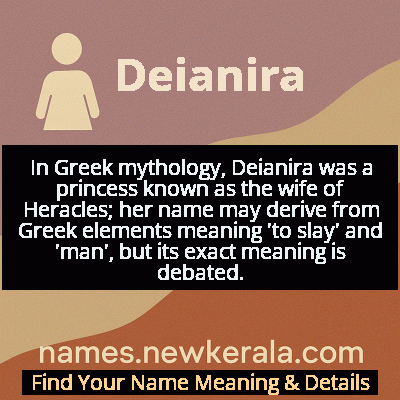Deianira Name Meaning & Details
Origin, Popularity, Numerology Analysis & Name Meaning of Deianira
Discover the origin, meaning, and cultural significance of the name DEIANIRA. Delve into its historical roots and explore the lasting impact it has had on communities and traditions.
Name
Deianira
Gender
Female
Origin
Greek
Lucky Number
7
Meaning of the Name - Deianira
In Greek mythology, Deianira was a princess known as the wife of Heracles; her name may derive from Greek elements meaning 'to slay' and 'man', but its exact meaning is debated.
Deianira - Complete Numerology Analysis
Your Numerology Number
Based on Pythagorean Numerology System
Ruling Planet
Neptune (Ketu)
Positive Nature
Intuitive, analytical, spiritual, and inquisitive.
Negative Traits
Secretive, reserved, aloof, and can be overly critical.
Lucky Colours
Green, yellow.
Lucky Days
Monday.
Lucky Stones
Cat’s eye, moonstone.
Harmony Numbers
1, 5, 6.
Best Suited Professions
Scientists, researchers, spiritual leaders, detectives.
What People Like About You
Depth of knowledge, analytical skills, spirituality.
Famous People Named Deianira
Deianira of Greek Mythology
Mythological Figure
Central figure in the tragic story of Hercules' death, featured in Sophocles' 'Women of Trachis'
Deianira (Handel's Opera)
Operatic Character
Title role in George Frideric Handel's 1736 opera 'Dejanira' based on Hercules myths
Deianira (Modern Literature)
Literary Character
Appears in contemporary retellings of Greek mythology including works by Mary Renault and Rick Riordan
Name Variations & International Equivalents
Click on blue names to explore their detailed meanings. Gray names with will be available soon.
Cultural & Historical Significance
The cultural resonance of Deianira's story extends far beyond ancient texts, influencing art, opera, and literature for centuries. During the Renaissance, her tragic tale was frequently depicted in paintings and sculptures, often emphasizing her role as an unwitting instrument of her husband's demise. In the Baroque period, composers like Handel created operas centered on her character, exploring the emotional depth of her predicament. Modern feminist readings have reinterpreted Deianira as a victim of patriarchal structures, highlighting how her actions stem from genuine love and concern rather than malice. Her enduring cultural significance lies in her representation of how good intentions can lead to catastrophic outcomes, making her story perpetually relevant to discussions of morality, love, and human fallibility.
Extended Personality Analysis
The name Deianira evokes a personality profile marked by intense emotional depth, fierce loyalty, and tragic complexity. Drawing from her mythological origins, individuals with this name are often perceived as deeply passionate and romantically devoted, yet vulnerable to insecurities that can cloud their judgment. Their love tends to be all-consuming and protective, sometimes leading them to take extreme measures to preserve relationships they fear losing. This emotional intensity makes them remarkably perceptive about others' feelings, though it can also result in occasional dramatic reactions when they feel threatened or uncertain.
Beyond the tragic associations, modern Deianiras often demonstrate remarkable resilience and creative intelligence. They tend to be artistically inclined, with a natural appreciation for beauty, literature, and the dramatic arts. Their classical name often inspires an interest in history, mythology, and cultural studies. While they may struggle with self-doubt at times, they possess an inner strength that helps them overcome adversity. In social settings, Deianiras are typically warm and engaging, though they may reserve their deepest emotions for trusted companions. The name suggests someone who experiences life with profound emotional richness, making them both vulnerable and extraordinarily strong in facing life's challenges.
Modern Usage & Popularity
In contemporary naming practices, Deianira remains an uncommon but meaningful choice that appeals to parents seeking names with classical gravitas and mythological significance. The name sees occasional use in Greece and Italy, where classical names maintain cultural relevance, and among diaspora communities preserving Hellenic heritage. While it doesn't appear on mainstream baby name charts in English-speaking countries, Deianira has experienced a modest revival alongside the broader trend of mythological and ancient names. Modern parents who choose this name often appreciate its melodic quality, historical depth, and the powerful story behind it, though some may be hesitant due to the tragic connotations. The name is particularly popular among academics, classicists, and families with Greek ancestry who value its authentic origins. Recent years have seen increased interest in mythological names, potentially leading to greater recognition and usage of Deianira, especially as parents seek unique alternatives to more common classical names like Cassandra or Penelope.
Symbolic & Spiritual Meanings
Symbolically, Deianira represents one of mythology's most poignant metaphors for the unintended consequences of love and the tragic gap between intention and outcome. Her name's literal meaning—'destroyer of her husband'—functions as a cruel irony that underscores the tragic dimension of her story. The poisoned robe she gives to Hercules becomes a powerful symbol of how love, when contaminated by deception and magical interference, can transform into its destructive opposite. This garment represents the dangerous intersection of domestic care and supernatural forces, serving as a metaphor for how well-meaning actions can have catastrophic results when based on incomplete information or manipulated by malicious influences.
On a deeper symbolic level, Deianira embodies the archetype of the loyal partner whose love becomes tragically destructive through circumstance and manipulation. Her story symbolizes the vulnerability of trust and how easily it can be exploited. The centaur Nessus, who provides the poisoned cloak, represents external corruption entering an otherwise loving relationship. Deianira's subsequent suicide adds another layer of symbolism, representing the ultimate price of unintended harm and the weight of guilt. Her narrative has been interpreted as an allegory for the dangers of seeking magical solutions to relationship problems and the importance of communication in partnerships. In modern psychological terms, Deianira symbolizes how projection and insecurity can distort loving intentions, making her name a powerful emblem of tragic love and the complex dynamics of human relationships.

